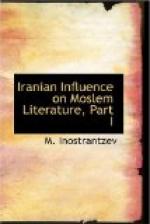[Naturally I do not deny altogether that Burzgmihir was a historical personage but he possessed by no means the importance which the tradition in question ascribes to him. The ascription is purely an erroneous inference from the above-mentioned report of the circumstances touching the mission of Burzoe, has not the slightest inherent probability, and is besides wanting not only in other manuscripts but also in all the older translations.]
We cannot question the fact that this section of the Arabic work in the main reproduces the Introduction composed by the Chief physician Burzoe himself to the book translated by him into Pehlevi from an Indian language. That language as Hertel has shown was Sanskrit, which fact, however, does not preclude the possibility of an Indian interpreter translating the original text to the Persian who spoke a modern Indian tongue. Several passages speak to the fact that the author of the Introduction is the physician. Why should Ibn Moqaffa pretend that Burzoe earnestly studied medicine and practised it? Moreover, the section is familiar with those principles of Indian medicine of which Ibn Moqaffa could otherwise know little and the exposition of which he had no call to deal with. The entire situation seems to me to harmonise with the circumstances of the Persian physician. Specially noteworthy is the encomium on the Persian sovereign.
[Sidenote: Ibn Moqaffa took liberties with the Pehlevi.]
This is, however, not equivalent to saying that the Arabic text is an exact replica, down to details, of the original of Burzoe. In the first place it has to be observed that Ibn Moqaffa was no pure translator at all but a regular redactor of his model. His object was to prepare a work suitable to the taste of his highly educated readers and at the same time entertaining and instructive. He proceeded, therefore, not only with a tolerably free hand as an artist in words but added good many things of his own. Above all here we have to bear in mind the trial of Dimna. That this chapter is an addition by a Muslim who would not let pass in silence the acknowledgement of clever but demeaning intrigue was already recognised by Benfey and we need not doubt but that it originated with Ibn Moqaffa. I would also claim, for Ibn Moqaffa the somewhat unimportant history of the anchorite and his guest. The manner of his narrative we learn from his own preface. It is especially to be noted that here also as in the trial of Dimna he recounts anecdotes after the Indian fashion.
[Sidenote: Ibn Moqaffa’s religious scepticism.]
It is accordingly not impossible that in our Burzoe chapter there are a few things which have originated not with the Persian physician of old but with Ibn Moqaffa; and this, I presume, as I showed long ago, specially from the disquisition on enquiry into the uncertainty of religions. It appears much more to fit in with Ibn Moqaffa than Burzoe.




